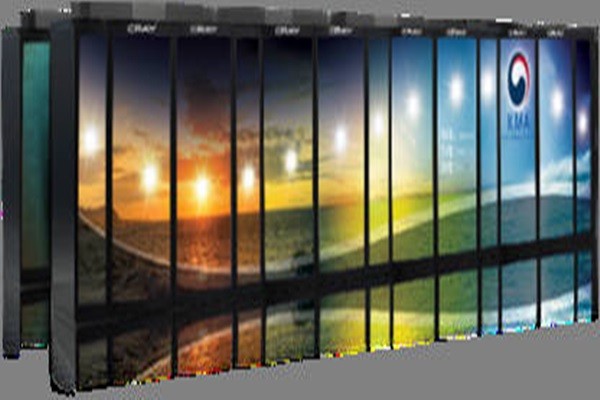South Korean Government chose Lenovo as the preferential bidder for Korea Meteorological Administration’s next-generation super-computer project worth $51.3 million (60 billion KRW). If their negotiation actually leads to a contract signing, this will be the first time a South Korean public agency adopting a super-computer from a Chinese manufacturer.
According to relevant industries, Public Procurement Service (PPS) recently chose Lenovo as the preferential bidder for bringing super-computer unit 5 for Korea Meteorological Administration (KMA) and is in the final stage of negotiation with Lenovo. Lenovo earned this opportunity after competing against an American super-computer manufacturer called Cray, which supplied super-computer unit 2, 3, and 4 to KMA in the past.
If negotiation process goes smoothly, it is likely that PPS and Lenovo will sign a final contract by end of this month. So far, public agencies such as KMA, KISTI (Korea Institute of Science and Technology Information), and IBS (Institute for Basic Science) use super-computers from Cray.
It is heard that Lenovo’s competitive price had a significant impact being chosen as the preferential bidder. Lenovo will continue to be active in remaining negotiation process and there is a high chance that it will strike a final contract with PPS.
“We heard that Lenovo had made very aggressive approach from various aspects to secure a huge reference like KMA.” said a representative for the IT industry. “It is likely that it presented favorable conditions as part of its strategy to grab the upper hand within South Korean market in the future.”
South Korean industries are interested on whether Lenovo beating out Cray will have any impact on current trade conflict between the U.S. and China. They declared ‘ceasefire’ during G20 Summit that was held last week and are preparing to have negotiations in the near future.

Experts believe that Lenovo beating out Cray will have little or zero impact on current conflict issue between the U.S. and China. U.S. Department of Commerce put Huawei onto its list of restraint of trade and announced so-called ‘blacklist’ that includes a Chinese business related to super-computer and five national research institutes last month. However, Lenovo is not included in either list. Lenovo acquired IBM’s x86 server business in 2014.
“Although it was reported that Lenovo’s stocks collapsed last year due to spy chip issue by a Chinese server provider, this report is groundless and Lenovo is not a subject to U.S. Government’s sanction.” said a representative for the industry. “Looking at how KMA’s system is formed and suppliers of system components, there is almost zero chance that Lenovo will cause any issue in the future.”
“Considering the fact that Cray is specializes in weather-related industries, it is important to see whether Lenovo can provide similar level of services.” said the same representative for the industry.
KMA is planning to operate its new super-computer in 2020. It makes weather forecast based on estimated weather chart produced through numerical analysis after entering meteorological information into its super-computer. Its super-computer unit 4 produces about 160,000 weather charts daily.
Performance of the super-computer unit 5 is 50 petaflops. Petaflops is a unit of computing speed equal to one quadrillion floating-point operations per second. Computer performance of the super-computer unit 5 is expected to be eight times faster than of the unit 4 (6.2 petaflops).
Super-computer unit 5 also increases resolution of numerical weather prediction model that is a program that calculates Earth’s atmosphere by dividing it into smaller grids. It can reduce size of the grid that is currently 17km less than 10km.
Staff Reporter Choi, Ho | snoop@etnews.com